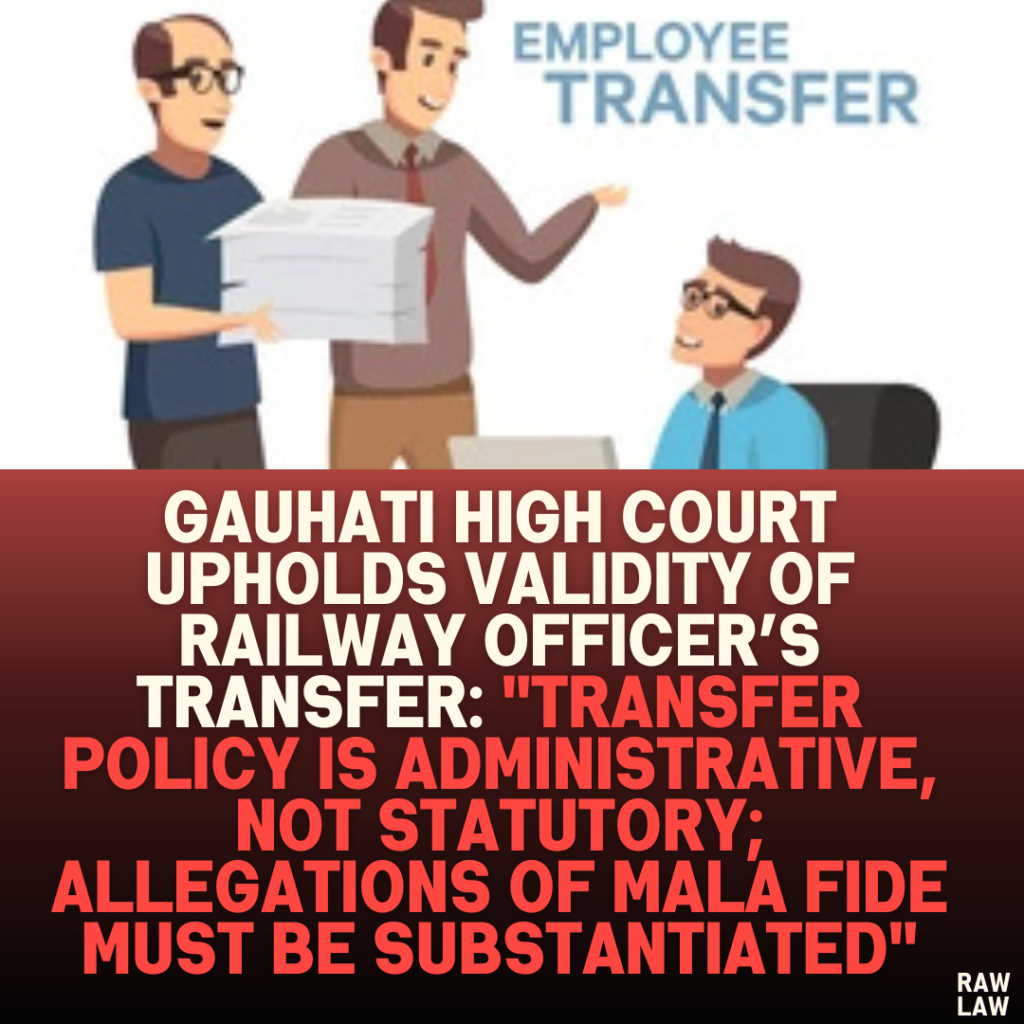Court’s Decision:
The Gauhati High Court set aside the Central Administrative Tribunal’s (CAT) order that had invalidated the transfer of a Group ‘A’ officer of the Indian Railways from the Northeast Frontier Railway (N.F. Railway) to South Central Railway. The court held that transfer is an inherent aspect of service, emphasizing that there was no statutory violation or mala fide intent in this case to warrant interference.
Facts:
- The respondent, a Group ‘A’ officer in the Indian Railway Service of Mechanical Engineers (IRSME), joined in 2012 and was initially posted in N.F. Railway in 2014.
- He was transferred within the N.F. Railway zone from Dibrugarh to Guwahati in February 2023. Shortly after, in September 2023, he was transferred to the South Central Railway zone.
- The officer challenged the transfer order, arguing that:
- It violated the Comprehensive Transfer Policy dated 31.08.2015, which prescribes a minimum tenure of two years on a post.
- The transfer disrupted his children’s education.
- It was carried out without a recommendation from the Placement Committee, which is a procedural requirement for Group ‘A’ officers.
- The transfer was motivated by mala fide intent to accommodate another officer.
- The CAT quashed the transfer, stating it violated the statutory transfer policy and was motivated by malice to facilitate another officer’s posting.
Issues:
- Was the transfer order in violation of the Comprehensive Transfer Policy?
- Did the transfer suffer from mala fide intent?
- Was judicial interference warranted in this administrative decision?
Petitioner’s Arguments (Union of India and Railway Authorities):
- Compliance with Policy:
- The policy allows transfers for Junior and Senior Scale officers without adhering to the minimum tenure requirements.
- The respondent had served over nine years in N.F. Railway, justifying his transfer for career progression.
- Placement Committee’s Role:
- The transfer was based on a recommendation from a Railway Board member in the absence of a Placement Committee, which satisfied procedural requirements.
- Mala Fide Allegations:
- The accusations were vague, lacked supporting evidence, and were procedurally deficient since the officers accused of bias were not impleaded.
- Judicial Precedents:
- The court’s role in transfer matters is limited unless there is proof of mala fide intent or violation of statutory provisions.
Respondent’s Arguments:
- Violation of Transfer Policy:
- The transfer violated the two-year minimum tenure rule. The officer was moved from Guwahati to South Central Railway just six months after being posted.
- No Placement Committee recommendation was obtained for the transfer, violating procedural norms.
- Mala Fide Intent:
- The transfer was executed to facilitate another officer’s placement.
- Allegations of bias and victimization were raised against senior officers but lacked direct evidence.
- Hardship:
- The transfer disrupted his children’s education and was done without legitimate administrative exigencies.
- Nature of Policy:
- While not statutory, the policy must be adhered to unless overridden by clear and justifiable reasons.
Analysis of the Law:
- Transfer Policy Interpretation:
- The court found that the Comprehensive Transfer Policy is an administrative guideline and not statutory.
- It does not impose an absolute bar on transferring Junior or Senior Scale officers before completing the minimum tenure.
- Judicial Review of Transfers:
- Transfers are routine administrative decisions. Courts can only intervene if the transfer is:
- Arbitrary.
- Violates a statutory provision.
- Demonstrably mala fide.
- Transfers are routine administrative decisions. Courts can only intervene if the transfer is:
- Role of Placement Committee:
- The court noted that while Placement Committee recommendations are generally required, the absence of such a recommendation does not inherently invalidate a transfer if alternative procedures are followed.
Precedent Analysis:
- Punjab and Sind Bank v. Durgesh Kuwar (2020):
- Transfers are service exigencies; courts should not interfere unless they are mala fide or violate statutory provisions.
- S.L. Abbas (1993):
- Employees cannot claim a vested right to specific postings.
- Ms. X v. Registrar General, Madhya Pradesh High Court (2022):
- Mala fide intent must be proven with substantial evidence. Mere assertions are insufficient.
- Ratnagiri Gas and Power Pvt. Ltd. v. RDS Projects Ltd. (2013):
- Allegations of mala fide require impleading the accused individuals to ensure procedural fairness.
Court’s Reasoning:
- Transfer Policy:
- The policy does not prohibit inter-zone transfers for Junior and Senior Scale officers.
- The respondent’s transfer was aimed at career progression, aligning with administrative guidelines.
- Mala Fide Allegations:
- The allegations lacked substantive proof.
- The officers accused of bias were not impleaded, undermining procedural validity.
- Administrative Exigencies:
- The respondent had served in N.F. Railway for over nine years. Transferring him to another zone provided broader exposure, which is a legitimate administrative objective.
Conclusion:
The court quashed the CAT’s order, reinstating the validity of the transfer. It held that:
- The transfer policy is an administrative guideline, not a statutory mandate.
- There was no evidence of mala fide intent.
- Judicial interference was unwarranted as the transfer adhered to service exigencies.
Implications:
- Judicial Limitation:
- The judgment reinforces limited judicial intervention in administrative decisions like transfers.
- Service Guidelines:
- Non-statutory guidelines, while significant, do not override administrative discretion unless statutory provisions are breached.
- Proof of Mala Fides:
- Allegations of bias must be supported by evidence and proper impleading of accused individuals.




Pingback: Kerala High Court: "Vicarious Liability is Unknown in Criminal Jurisprudence Unless Specifically Provided by Statute"; Mere Association Does Not Attract Criminal Liability Without Active Involvement or Mens Rea - Raw Law